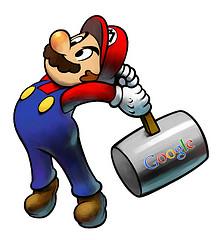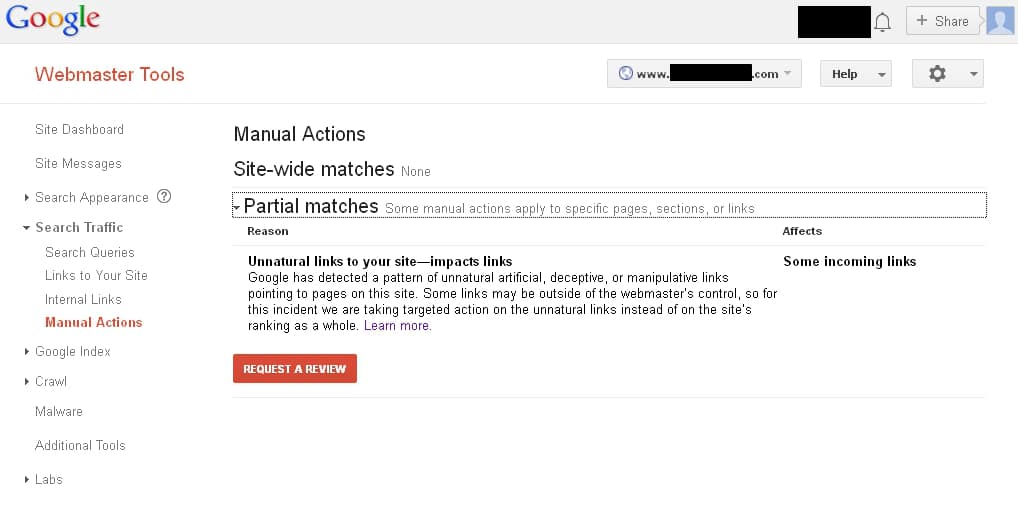
The weighty sword of Google comes down heavy on websites or blogs that defy the codes of proper conduct in the online marketing industry. If you try to take Google for a ride, especially in the search engine optimization scenario, you are bound to end up paying for it. It will come to bit you sooner rather than later. Despite best intentions not to rub Google the wrong way, you might find that the competition around you is pushing you astray. Once penalized, it takes a lot of hard work to claw your way back.
How to cope up with Google Search updates?
Top 3 ways to combat Google penalty
Here are the top 3 ways to keep your website out of Google’s harmful penalty:
- Remove Poor Backlinks: It doesn’t take much to spot those low-quality backlinks that are not paying you any dividends anyway. These backlinks were probably added sometime in the past when you were desperate for some online visibility. Now that your website or blog is better placed, remove those backlinks that reflect poorly on not just your online brand, but also your reputation with Google. You will find it easy to identify those poor links by measuring the influx of online traffic from your existing backlinks.
- Backlink Statistics: The first point gives birth to this one. It is very necessary that you have all your backlink statistics ready with you. Before Google hauls you up for overusing the anchor texts or other digressions, you need to remove or modify them yourself. Do not wait for warnings to come your way. There are several online tools, like Google Webmaster Tools, that give you a comprehensive understanding of your backlink framework. Use the statistics regularly to keep track of your backlinks.
- Content Management and Documentation: Most online brands make use of content to reach out their marketing message. It may be in the form of articles, blogs, press releases or website content. Keep a document of content that you publish online, along with the date and corresponding URL. It will be a tough process to keep updating it but when the tide turns against you, you can quickly find out the piece of writing that has irked Google. Include your social media presence in this documentation. Use Google Spreadsheets to update this document.
Related reading: How to analyze backlinks? & Link auditing tips
Google to Inform about Manual Penalty on Websites

SEO teams get perplexed when the ranking on the websites falls from the first page to the fifth. The SEO professionals keep looking for reasons why it happened that way. If some black hat policies have been implemented, they would know in their hearts that their trickery has been exposed. However, in the absence of such policies, the SEO team finds it really difficult to find out where the error lies. There is help at hand now! Search engine giant Google will inform you about the reason of such a slide in rankings in case of manual penalties imposed on your website.
Related reading – Tips to benefit from Google Panda and Penguin, Difference between Google Panda and Penguin, How can you test your website is affected by Penguin?
You can request Google to supply you with the reason why the SERP rankings changed for the worse overnight. It could be that your website has been manually penalized for not adhering to the webmaster guidelines set up by Google. The usual suspects for a slide in ranks are better content of competitor websites and the use of spamming that proves counter-productive. SEO services need not keep guessing. File a request through the ‘reconsideration request’ option on Google. The search engine giant will get back to you with hints as to what the problem is.
It is not always true that your website fell in rankings because of some fault of the website. There may be a bug in the algorithm of Google as well. It can also be that the server that is hosting your website is not working right. Google will inform you about these problems as well. When you act on their reply and get the error fixed, the penalty will be revoked. This is a very important step that Google has taken to bring about transparency in search engine optimization methods. SEO professionals over the world are feeling much relieved that they will not need to go out on an error-hunting drill anymore!
The Mechanics of Google’s Manual Penalties

What is Google Manual Penalty?
Algorithms are not always capable of handling the misuse of Google’s search engine, though they are the preferred means of doing so. There is a strong case why algorithms are allowed to decide on the question of penalty. Other than the obvious one of being impartial to sites in taking the penal action, there is also the question of uniformity. It is not enough that you prevent one site from misusing Google’s search engines. It is necessary to stop all such other sites employing the same kind of means.
It is only in times of extremity that manual penalties come into the picture. These cases are for sites which swing to extremities in abusing the search results and spamming keywords incessantly, despite repeated and numerous warnings. The best part about these manual penalties is that they are not taken entirely by a single team. Manual penalties are imposed by a team and they have to be reviewed by another team. This makes the whole process of manual penalties impartial and objective.
The practice of getting a team to review an imposed manual penalty gives hope to the webmasters that Google does not take the question of penal action lightly or casually.
An example of manual penalty could be Google’s action against companies which continued with job listings that were not valid anymore. Expired job listings were asked to be removed immediately within a period of time. Defaulters were charged with manual penalties.
There is a lot of difference between a penalty and the inability of site to grab ranks. Sometimes, sites not being able to rank use the excuse of penalties. A good way to know the difference is to check if the site has been indexed by Google. If there is a SERP index, it shows that the site has not been penalized and is just not being able to rank.
Top 3 Negative Signals Google Picks Up from Your Website
You have a website that you have optimized properly by following all the diktats of Google. You have a crack SEO team working round the clock for you. Yet, you find that your website is rolling at the bottom of the SERP heap.
No matter how much you spend in PPC or how much time you spend researching keywords, the SEO front looks bleak. You are desperate for success. Sounds familiar? Look at your website again. Here are the top 3 negative signals that Google is picking up from your website. Remove them and you are ready for a fresh salvo!
Experts on Board
Your website content is probably written by an expert who knows a good deal about the topic. You hired experts to write for you because your SEO guy told you that Google has twin devils by the name of Penguin and Panda that value quality content.
But you have posted these write-ups with a byline that reads ‘Admin’ or ‘Joe’. What ideas does that give Google or even a layman reader about your website? That your website is all smoke and mirror! Why not get the name of the writer published (or even a fictitious one, a real name!) along with a short bio (fictitious but believable should do!)?
Comprehension for a Toss
Google loves fresh content on the website and the attached blog. Hearing this from your SEO guy, you order for content to be published every single day, sometimes even multiple posts per day! Then you question why Google is not paying any attention to the noise you are making in the content department.
Easy answer: no one can read or understand your content. Most online companies invest in content farming and fill up their websites and blogs with incomprehensible content. That does nothing for your SEO rank, nor does it endear you to Google’s algorithms. You also need to constantly update and edit old content in proper format (Merging similar topic into single one & redirecting old urls to new one, or deleting thin content or obsolete content from your website)
Redundancy is the Key
Content is often tied up with keywords in a way that keywords rule content. Most SEO firms work this way. For them, keyword is the king and content is the consort. It should ideally be the other way round! Your focus should be (because Google’s is!) on the quality and variety of the content.
Repeating the same topics for the sake of keywords or unnecessarily packing in keywords will not help your SEO cause in any way. Rather it is a counterproductive way of undoing all your optimizing and online promoting because you can never break into the first or second page of the SERP!
If my page is falling down in Google SERP then how can I know exactly the reason
- You’re tracking the wrong keywords.
- The Google “dance”
- New website revamp with new urls
- Low quality links.
- Losing good links.
- Bad hosting.
- Incorrect robots.txt file.
- Competitors.
- Google update.
- Google penalty/malware.
- Duplicate or old thin content
- Keyword cannibalism or topic cannibalism on your website
Related reading: How to do digital marketing rightly
Penalty for Google Adsense Publishers
Alert for Google Adsense publishers! Anyone familiar with the world of online advertising knows what click baiting is. Loosely explained, click baiting is when you entice an online user into clicking on an ad despite the user’s disinclination to do so. There are plenty of ways in which online ad publishers trick users into clicking on ads they would not click if not for the deceit.Google Adsense has decided to take some stringent action against such click baiting.
There are several unscrupulous ways in which ad publishers take resort to click baiting. Some blend in their ad content with the background of the page in a way that users think that they are actually clicking on some useful link. In a second, they know that they have clicked on an ad. The other trick used is to place ads strategically around navigation buttons, like a dropdown menu. Many users are unable to do the pointing correctly and end up clicking on the ad.
Other ways of click baiting include something called click ring. What happens here is a network of ad publishers get together to click on each other’s ads! As a result, all of them get more clicks on their ads, and more revenue.
Look at some of the points put out by Google that defines what an ‘invalid click’ is:
- Ad publishers encouraging users to click through deceptive language, navigational tricks or through inciting accidental clicks
- Use of clicking tools like clickbots, other forms of robots or software
- Clicks registered by ad publishers by clicking on their own ads
- Getting ads clicked by others repeatedly, in a non-organic manner
You will find ad data about Google ads on the developer page dedicated for this purpose. Any ad publisher who doesn’t want to fall foul of the new rules should do something about keeping a track of traffic coming from ads. If they feel that something is wrong, they should fix the problem before Google comes calling with a penalty. But this will not affect most publishers of ads. The ones affected will be informed through Adsense Control Panel Policy center.








Thanks for sharing the blog’s information and it’s importance. The content is very useful and informative.
Thank you
It’s also important to know how a brand can protect their website avoiding Google penalties beside its progression.
This blog seemed to be a helpful one!!
Thank you Arindam. Yes definitely. All brands must take utmost care to follow Google guidelines strictly and to focus more on page experience, user experience & customer experience such as – Meaningful relevant titles unique to every page, unique relevant content per page, updating old content, easy simple design and layout, users’ safety , getting genuine reviews, earning spontaneous natural links, right internal links, natural social sharing & media coverage etc. So if brands focus on these white-hat techniques rather than manipulating parameters for search engine ranking in black-hat manner , their websites will be fully safe from Google penalties. Follow Google webmaster guidelines.
Hi Debajyoti sir
Your approach hits the nail on the head because people will trigger the sections that can positively affect their web property if they follow it. If not, then they will get that dreaded “manual Spam” notification sooner or later.
To summarize: You don’t have to be afraid of Google or the algorithm. Do things the way Google asks you to do them, and you will be rewarded.
Thank you for all of your hard work and dedication to people who are trying to make a living online
Thank you Shoiab. Yes you nailed it. You don’t have to be afraid of Google or the algorithm. Do things the way Google asks you to do them, and you will be rewarded. Think from customer’s point of view, user’s point of view and focus to provide more value and better experience to your users.
Dear Sir, Your blog is a very useful and easy way to explain to others Thank you. Regards from Super310.in